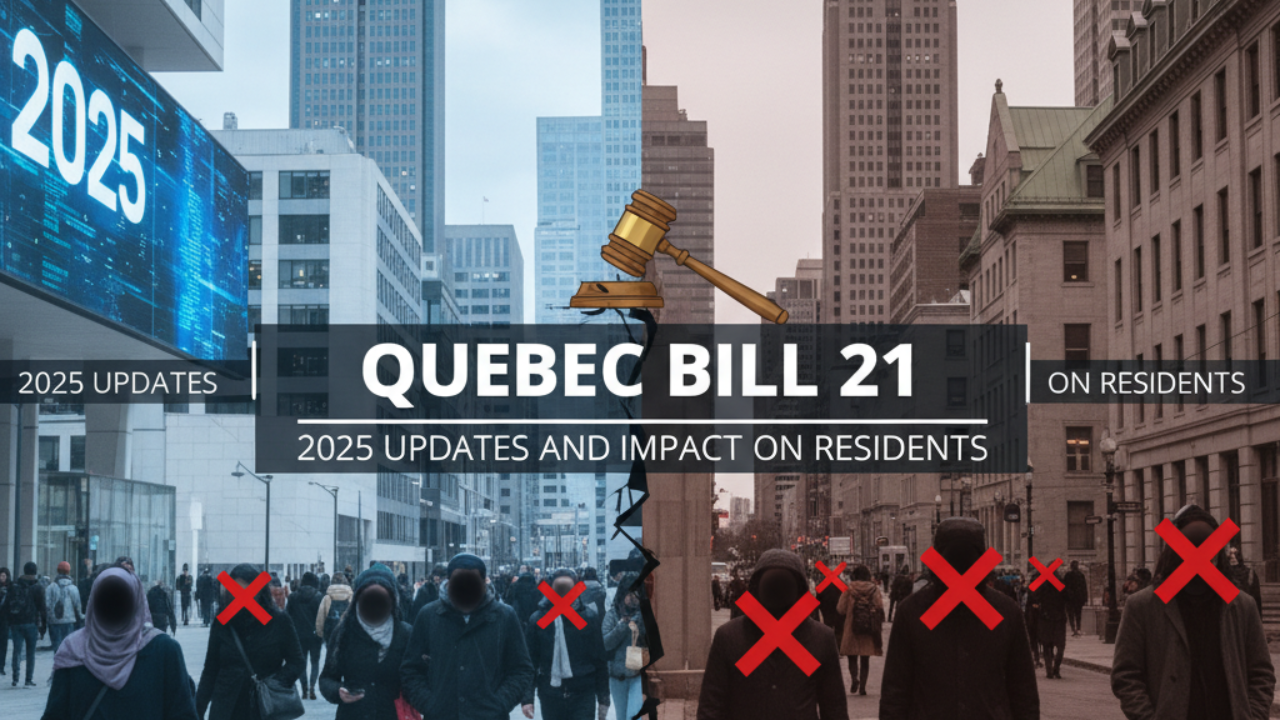
Sacramento Helicopter Crash Leaves Three Crew Memb
A medical helicopter crashed on Highway 50 in Sacramento; three crew members are critically injured,

Bill 21, officially known as the “Act Respecting the Laicity of the State,” was passed in June 2019 by the Quebec government led by the Coalition Avenir Québec (CAQ). The law prohibits certain public sector employees—including teachers, police officers, judges, and other authority figures—from wearing religious symbols while performing their duties. The government has framed the legislation as a way to preserve Quebec’s secular identity, ensuring that state institutions remain neutral and free from religious influence. However, the law has faced significant criticism for its perceived discrimination against religious minorities, particularly Muslim women who wear the hijab, Sikh men who wear turbans, and Jewish men who wear kippahs.
Since its adoption, Bill 21 has been challenged in the courts multiple times. Civil rights groups, community organizations, and individuals affected by the law argue that it violates the Canadian Charter of Rights and Freedoms. However, Quebec has invoked the “notwithstanding clause” of the Charter, which allows provinces to override certain constitutional protections for a limited time. In 2021, a Quebec Superior Court judge upheld much of the law but exempted English-language school boards, ruling that it violated minority language education rights. The decision was appealed, and the case has continued to make its way through higher courts. As of 2025, the law is still under review, with many anticipating that it could eventually reach the Supreme Court of Canada, where a landmark ruling may decide its long-term future.
Teachers have been among the most directly affected by Bill 21. Many aspiring educators from religious minorities have faced career barriers, forced to choose between their faith and their profession. In some cases, qualified candidates have left Quebec or chosen different career paths to avoid restrictions. Critics argue that the law worsens teacher shortages in a province already struggling to fill positions. Similarly, aspiring police officers, judges, and government employees face limitations on their employment opportunities, leading to concerns about diversity and representation in public institutions.
Public opinion on Bill 21 remains divided. Polls consistently show that a majority of Quebecers support the law, viewing it as an important measure to maintain secularism in public institutions. For many, the law reflects Quebec’s distinct cultural values, rooted in a history of separating religion from government after decades of Catholic Church influence. However, opposition is strong among civil liberties advocates, minority communities, and younger generations who see the law as discriminatory and exclusionary. The debate highlights a broader tension between Quebec’s pursuit of cultural autonomy and Canada’s emphasis on multiculturalism and individual rights.
Beyond the legal and political debates, Bill 21 has had a profound impact on social cohesion in Quebec. Many residents who wear religious symbols report feeling marginalized or targeted in public life. The law has intensified discussions about identity, belonging, and inclusivity. Supporters argue that it promotes equality by ensuring that all public servants appear neutral, while critics believe it reinforces systemic discrimination and stigmatizes visible minorities. This polarization has created challenges in fostering unity within Quebec’s increasingly diverse society.
For newcomers and immigrants, Bill 21 presents unique challenges. Many immigrants arrive in Quebec with professional qualifications but find themselves restricted from certain jobs due to the law. This has raised concerns about whether Bill 21 discourages highly skilled immigrants from settling in the province. Critics argue that the law undermines Quebec’s efforts to attract global talent, particularly at a time when the province faces labor shortages in critical sectors. Newcomers who want to integrate into Quebec society must navigate not only language and cultural adaptation but also the limitations imposed by Bill 21.
In 2025, Bill 21 continues to dominate Quebec’s political landscape. The ruling CAQ remains firm in defending the law, framing it as essential to Quebec’s identity and autonomy. Opposition parties such as the Liberal Party of Quebec and Québec solidaire have criticized the law, with some calling for its repeal. At the federal level, Prime Minister Justin Trudeau has expressed opposition to Bill 21 but has been cautious about direct intervention, given the sensitivities around Quebec’s autonomy. The political debate reflects broader questions about the balance between provincial powers, minority rights, and national unity.
Bill 21 has also drawn international attention, with human rights organizations such as Amnesty International and Human Rights Watch criticizing it as discriminatory. The law has been compared to secularism policies in countries like France, which ban religious symbols in public schools, but critics argue Quebec’s version goes further by restricting employment opportunities. International scrutiny has put pressure on Canada’s image as a defender of diversity and inclusion, highlighting tensions between Quebec’s cultural policies and global human rights standards.
Looking forward, the future of Bill 21 remains uncertain. If the case reaches the Supreme Court of Canada, a ruling against the law could trigger a political showdown between Quebec and Ottawa, raising questions about provincial autonomy and federal oversight. Even if the law remains in place, demographic changes and shifting public attitudes could eventually challenge its sustainability. Younger generations in Quebec, who tend to be more supportive of multiculturalism, may reshape the debate in the coming years. For now, Bill 21 continues to symbolize the complex balance between secularism, rights, and identity in Quebec.
Quebec’s Bill 21 is more than just a piece of legislation—it is a reflection of the province’s ongoing struggle to define its cultural identity within a diverse and multicultural Canada. In 2025, the law remains controversial, celebrated by supporters as a defense of secularism but condemned by opponents as discriminatory. Its impact on teachers, public sector workers, immigrants, and social cohesion makes it one of the most significant and divisive issues in Quebec politics today. Whether it stands or falls, Bill 21 will continue to shape debates about identity, rights, and governance in Quebec for years to come.